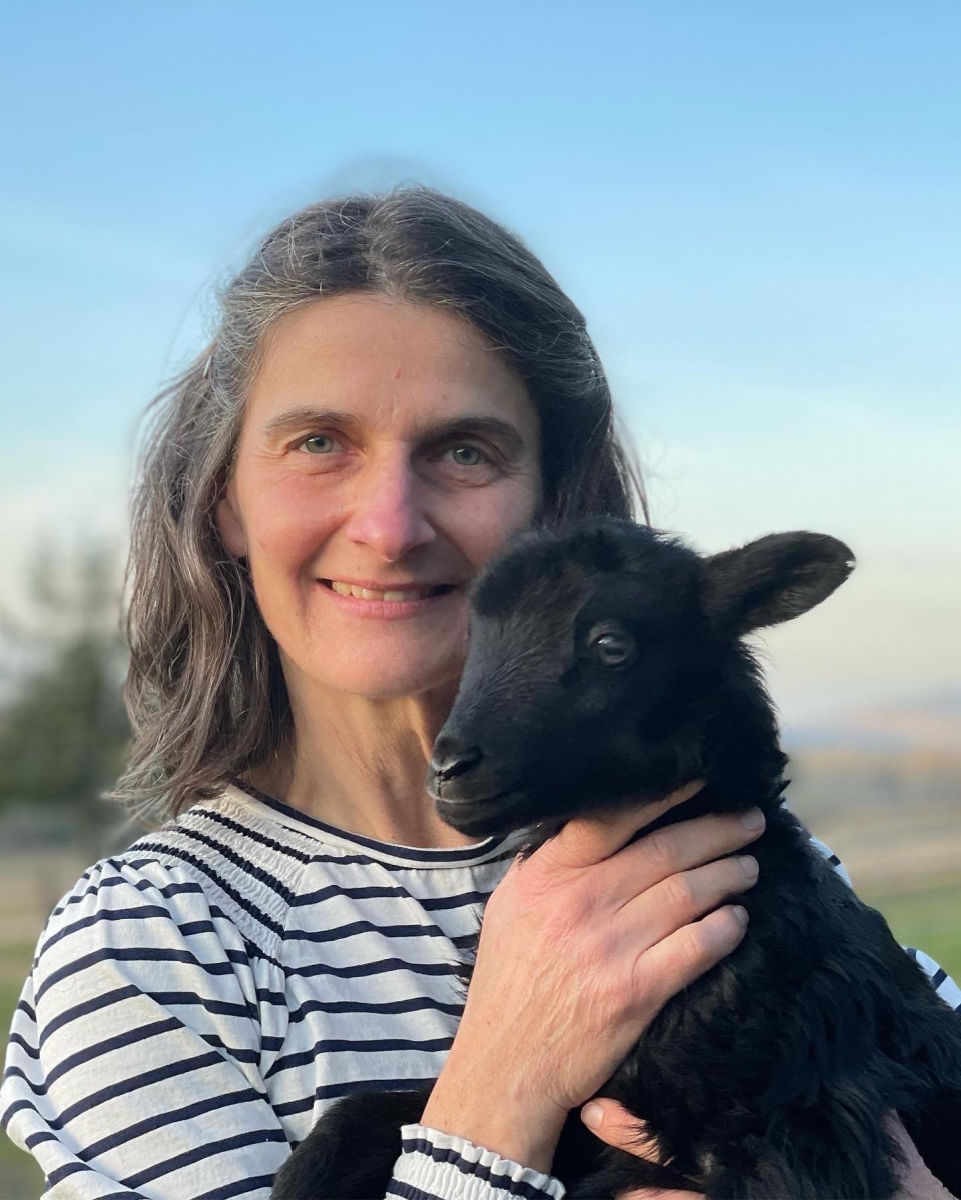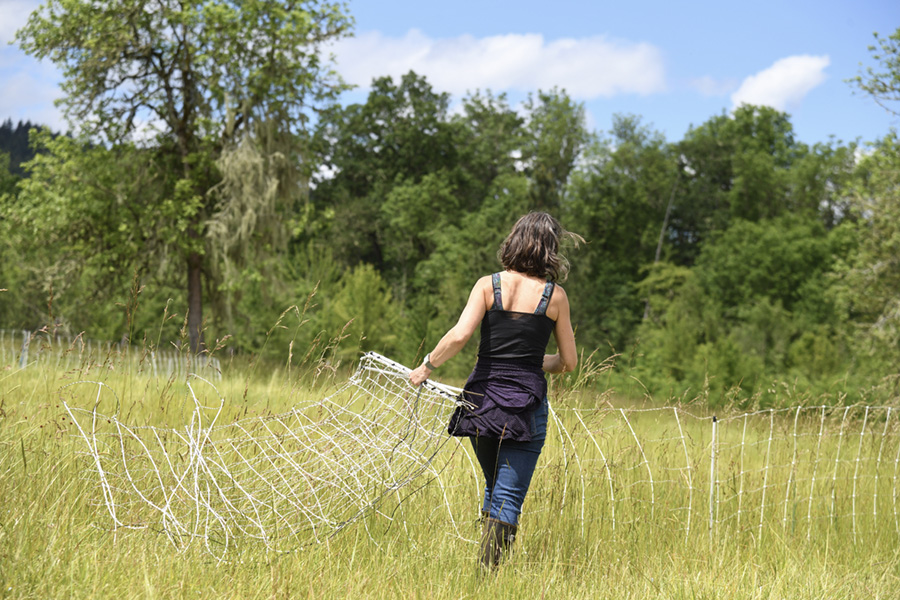I find that there are, on the web, many Blogs and interesting content on the many steps to starting to raise a flock of sheep (from selecting, to preparing, to set up, to infrastructure purchases, to educating oneself….)
The questions I get asked often pertain more to “the mind set and practical aspects of becoming a shepherd, a small farmer, a woman farmer, an urban farmer, a first generation small farmer”. In full disclosure I am NO EXPERT, only moved to share a few things I have learned along the way. One will argue that the answers to these questions can be very personal to each individual and that is true to a certain extent, but the overall feeling I get from people asking these questions is that it can be discouraging and daunting to get started and my overall sentiment (said in a very simplistic way) is that it does not necessarily have to be.
I grew up on a large (by French standard) “ferme maraichére” in the South West of France. My grandfather was a farmer, my father is a farmer and my brother is a farmer on our family farm. At the moment, the family farm grows vegetables (eggplants, peppers), corn, soy, sunflowers, and wheat, and specializes in Strawberries grown in greenhouses and above the ground. My father and my brother are entrepreneurs, they are excited to try new things. They are also dedicated to growing food that tastes good. Their mind set is “go big or go home”. I love and respect their approach and dedication to agriculture in France. My set up on our small farm is very, very different on all levels.
I inherited the soul of the farmer but I did not have the education, the land, the infrastructure, the support of a farming family in the US, and the fabric of a farming family to lean onto here in the US. Starting our small Appletree Farm was a work of love, made possible by me being able to mostly stay at home and by other things that fell into place.
Of late I have met and I have had conversations with women who have a dream of farming something. These women are at different stages of researching their project. Some of them are quite far along and just need a little bit of faith. Most of them are career women and need a change of pace (part time at their current work-part time on a farm). None of these women have hands on experience with farming really. All of these women would be first generation small farmers. All off these women need a change of pace motivated by where they are in life and an urgency to make something different happen. All of these women are capable of farming something.
So today, I feel compelled to say. If you are a woman with a passion for something in agriculture, if you are fortunate enough to have a bit of land, if your family unit can support your farming project financially until you break even or turn a small profit, If you are strong and healthy to work hard, daily, and outside, I would encourage you to reach out to whatever it is that interests you in agriculture and slowly start building the blocks, cementing them together to make your vision happen.
I will highlight that there are some essential steps to getting started and being somewhat successful. Now is a good time for me to say that, in spite of my continued support for small farms and women in agriculture, I am also deeply aware of the economics of the small farm, so here are some words of caution. In the last couple of years I have had to help re-home quite a few flocks mainly for one reason: A lack of foresight from the inexperienced buyer. (foresight for what the financial requirements would be, and what the workload would be to care for these animals). I will do my best to highlight here some essential steps that I have found were necessary to the process. Again, one should go deeper into each step and there are many resources available. Feel free to reach out if you are interested in specifics and I will gladly point you in the right direction.
Surround yourself by mentors: You can read all that you want but no book will replace the hands on experience that experienced shepherds/farmers will have acquired and will be able to share (life really is a combination of calculated risks/leaps of faith/learning by failing and succeeding).
Collaborate with others. One of my mentors told me once: “you do not have to make everything for your farm store, reach out to other makers”. This applies to other areas of farming. I reach out to my friend Laurel for problems during lambing, I reach out to my friend Ted for questions about growing food, I reach out to my father for big picture questions, all the time.
Take classes, read books. In the process of taking classes, you will inevitably meet other people who, like you, are starting. They might become part of your farming family to lean on at times.
Start small, don’t hoard animals: I cannot stress enough how important this is, especially if you are 100% new to shepherding (or raising any other livestock). On our farm I take really good care of each animal, I love them, I cherish them and they all have a place that makes sense for the economics of our small farm. My goal is to go into the winter with the best breeding ewes, the rams I will keep another year and their wether companions. Find what makes sense for your goals and set up but remember each animal needs to be fed and loved, so don’t spread yourself too thin, or above your infrastructure and financial capabilities.
Know the economics of your project, work with a mentor to budget the unexpected. Make sure you are not putting your family in a financial position that will stress everything/anything within your family unit. This is very important. I will say it black on white, having a small piece of land and the means to start a small farm still is a privilege in this country. Breaking even or turning a small profit can take a lot of time, so in a simplistic way, one of the questions you need to answer is “can our family operate on one income if I work on the farm, and my partner works away from the farm?” or if you are solo “can I afford this by myself?” Think worst case financial scenarios and put yourself in a position where you can handle them. This is important because this is your dream that you are building.
Think sustainability. Can this small operation be sustainable? Set up systems that will work through time. They might need to be improved or altered, but overall are they sustainable? Think sustainability at all levels, from finances to your physical health. Can I see myself doing this kind of physical work for the next 5-10 years?
And then, be prepared to show up daily, take leaps of faith, make things with your hands, be physical, work in the elements, raise children on a farm…..
Become part of the change, become a small farmer, and remember that in the end “if you eat, you are involved in agriculture” Wendell Berry.
Please reach out if you have any questions. I am a student of many mentors and a student of our small farm “Appletree Farm”. Like you I learn everyday. I learn from our farm’s ecosystems, from its working economics. I marvel in its beauty, I scream in the thick of the winter when all is wet, muddy, and cold and I still have to show up everyday, multiple times a day, but in the end I can’t let it go, it has become more than my work, it is my life. This post is a compilation of thoughts and research born from conversations with mostly women. I want it to be hopeful and realistic all at once. If I have failed to convey just how much I am excited for you to start a small agricultural endeavor, I am sorry. If I have succeeded in supporting you in a very small way, I am happy. The content of this post is an ongoing conversation, it should in no way replace the professional advice of a business or financial planner. If you are a woman, small farming, urban farming or first generation farming and would like to add to the conversation, feel free to send me a message.
Stéphanie


